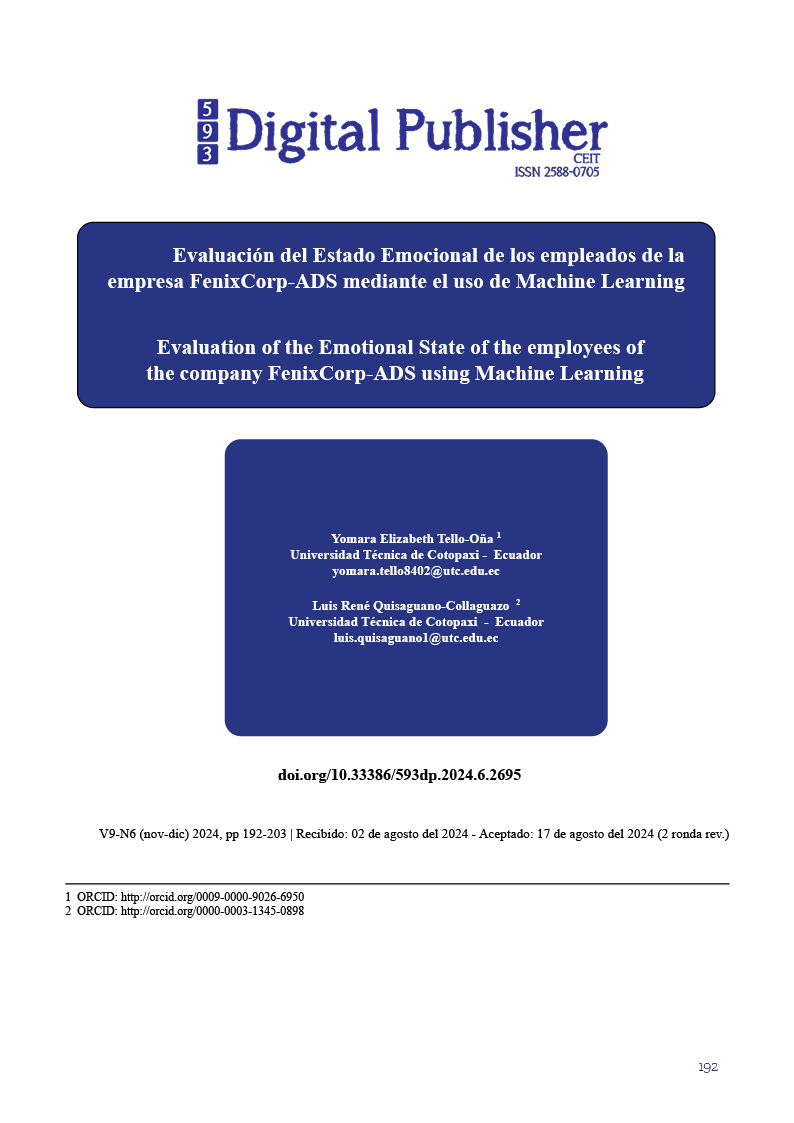Evaluation of the Emotional State of the employees of the company FenixCorp-ADS using Machine Learning
Main Article Content
Abstract
Artificial Intelligence (AI) is currently booming, not only in industrial processes, but also in fields related to activities that contribute to the development of organizations and human knowledge. Machine Learning is contained within the computational context of AI, divided into three main approaches: Supervised Machine Learning (AAS), Unsupervised Machine Learning and Reinforcement Learning, which are techniques and algorithms capable of "learning and reasoning" by simulating the human brain, and allows classifying and predicting the behavior of the data supplied to the chosen model, through the use of the SciKit-Learn library and other Python tools, a programming language widely used in data analysis and sentiment analysis, another tool for extracting information based on subjective opinions. Emotional State (ES) is a conscious and unconscious reaction in response to a specific stimulus at a specific time or situation that individuals have. In order to establish a possible relationship with the job performance of employees and the talent drain of the company FenixCorp-ADS, a questionnaire was developed via Web and the classification and prediction algorithms of supervised and unsupervised machine learning were chosen, which allowed a comparative analysis to determine the most efficient model of sentiment analysis performed, contributing to its application in a more continuous way by business organizations in order to use it to automate these processes.
Downloads
Article Details

This work is licensed under a Creative Commons Attribution-NonCommercial-ShareAlike 4.0 International License.
1. Derechos de autor
Las obras que se publican en 593 Digital Publisher CEIT están sujetas a los siguientes términos:
1.1. 593 Digital Publisher CEIT, conserva los derechos patrimoniales (copyright) de las obras publicadas, favorece y permite la reutilización de las mismas bajo la licencia Licencia Creative Commons 4.0 de Reconocimiento-NoComercial-CompartirIgual 4.0, por lo cual se pueden copiar, usar, difundir, transmitir y exponer públicamente, siempre que:
1.1.a. Se cite la autoría y fuente original de su publicación (revista, editorial, URL).
1.1.b. No se usen para fines comerciales u onerosos.
1.1.c. Se mencione la existencia y especificaciones de esta licencia de uso.
References
Alcalde Chulilla, J. (2021). Análisis de sentimiento de textos basado en opiniones de películas usando algoritmos de aprendizaje computacional [Tesis de grado, Universidad Oberta de Catalunya]. https://openaccess.uoc.edu/bitstream/10609/132328/7/jchulillaTFG0621memoria.pdf
Andrade Muñoz, J. (2023). Entendiendo el poder de la Inteligencia Artificial. TEPEXI, Boletín Científico de la Escuela Superior del Rio, 10(20), 4. https://repository.uaeh.edu.mx/revistas/index.php/tepexi/issue/archive
Aragón Zepeda, K. I. (2019). Inteligencia emocional y su relación en el desempeño laboral. Revista Naturaleza, Sociedad y Ambiente, 6(1), 57-67. https://doi.org/10.37533/cunsurori.v6i1.41
Blanco Canales, A. (2019). La emoción y sus componentes. Grupo LEIDE, 7. https://grupoleide.com/wp-content/uploads/2019/09/Ana-Blanco-y-Nati-Hern%C3%A1ndez-C%C3%B3mo-sentimos-la-L2.pdf
Bobadilla, J. (2020). Machine learning y deep learning. Usando Python. Ediciones de la U. https://api.pageplace.de/preview/DT0400.9789587921465_A41974869/preview-9789587921465_A41974869.pdf
Carceller Llorens, F. (2023). Detección de estados de ánimo usando técnicas de machine learning [Tesis Magister, Universidad Politécnica de Valencia]. http://polipapers.upv.es/index.php/IA/article/view/3293
Lovo, J. (2020). Síndrome de burnout: Un problema moderno. Entorno, 70, 110-120. https://doi.org/10.5377/entorno.v0i70.10371
Olivas, J. Á., Montoro, A., & Lorenzo, A. (2023). Informe OBS Inteligencia Artificial (p. 38). OBS Business School. https://marketing.onlinebschool.es/Prensa/Informes/Informe%20OBS%20Inteligencia%20Artificial%202023.pdf
Rosenbrock, G., Trossero, S., & Pascal, A. (2021). Técnicas de Análisis de Sentimientos Aplicadas a la Valoración de Opiniones en el Lenguaje Español. CACIC 2021 UNSa, 291-300. https://www.researchgate.net/publication/355887680_Tecnicas_de_Analisis_de_Sentimientos_Aplicadas_a_la_Valoracion_de_Opiniones_en_el_Lenguaje_Espanol
Saura, J. R., Reyes Menéndez, A., & Palos Sánchez, P. (2018). Un análisis de sentimiento en Twitter con Machine Learning: Identificando el sentimiento sobre oferta de #Black Friday. Revista Espacios, 39(42), 16. https://www.revistaespacios.com/a18v39n42/a18v39n42p16.pdf
Tamayo y Tamayo, M. (2003). El proceso de la investigación científica (4.a ed.). Limusa, S.A.
Velásquez Sánchez, E. (2022). Estado del Arte de Machine Learning y su Aplicación en el Experimento LHCb [Estado del arte de maestría en matemáticas, Universidad Nacional Autónoma de Honduras]. https://mm.unah.edu.hn/dmsdocument/13661-estado-del-arte-de-machine-learning-y-su-aplicacion-en-el-experimento-lhcb-pdf



